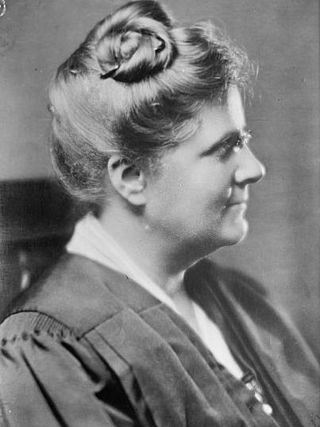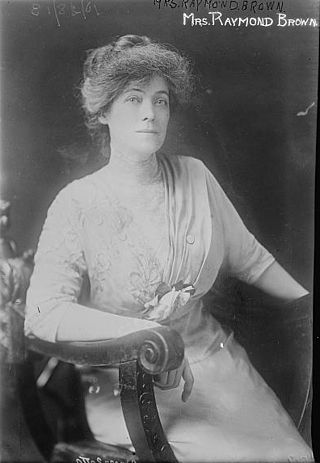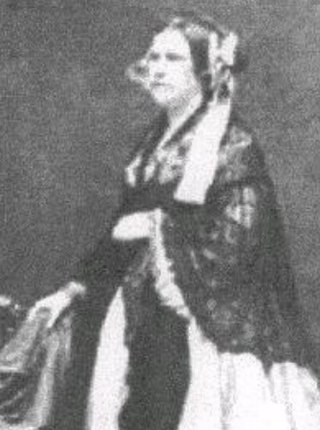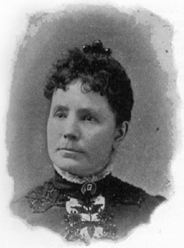Related Research Articles

Carrie Chapman Catt was an American women's suffrage leader who campaigned for the Nineteenth Amendment to the United States Constitution, which gave U.S. women the right to vote in 1920. Catt served as president of the National American Woman Suffrage Association from 1900 to 1904 and 1915 to 1920. She founded the League of Women Voters in 1920 and the International Woman Suffrage Alliance in 1904, which was later named International Alliance of Women. She "led an army of voteless women in 1919 to pressure Congress to pass the constitutional amendment giving them the right to vote and convinced state legislatures to ratify it in 1920". She "was one of the best-known women in the United States in the first half of the twentieth century and was on all lists of famous American women."
Josephine St. Pierre Ruffin was a publisher, journalist, civil rights leader, suffragist, abolitionist, and editor of the Woman's Era, the first national newspaper published by and for African American women.

Mary Terrell was an American civil rights activist, journalist, teacher and one of the first African-American women to earn a college degree. She taught in the Latin Department at the M Street School —the first African American public high school in the nation—in Washington, DC. In 1895, she was the first African-American woman in the United States to be appointed to the school board of a major city, serving in the District of Columbia until 1906. Terrell was a charter member of the National Association for the Advancement of Colored People (1909) and the Colored Women's League of Washington (1892). She helped found the National Association of Colored Women (1896) and served as its first national president, and she was a founding member of the National Association of College Women (1923).

Paulina Wright Davis was an American abolitionist, suffragist, and educator. She was one of the founders of the New England Woman Suffrage Association.

Florence Ellinwood Allen was a United States circuit judge of the United States Court of Appeals for the Sixth Circuit. She was the first woman to serve on a state supreme court and one of the first two women to serve as a United States federal judge. In 2005, she was inducted into the National Women's Hall of Fame.

Laura Clay, co-founder and first president of the Kentucky Equal Rights Association, was a leader of the American women's suffrage movement. She was one of the most important suffragists in the South, favoring the states' rights approach to suffrage. A powerful orator, she was active in the Democratic Party and had important leadership roles in local, state and national politics. In 1920 at the Democratic National Convention, she was one of two women, alongside Cora Wilson Stewart, to be the first women to have their names placed into nomination for the presidency at the convention of a major political party.

Pattie Ruffner Jacobs was an American suffragist from Birmingham, Alabama. She was inducted into the Alabama Women's Hall of Fame in 1978.

Anne Dallas Dudley was an American activist in the women's suffrage movement. She was a national and state leader in the fight for women's suffrage who worked to secure the ratification of the 19th Amendment in Tennessee.

Emma Smith DeVoe was an American women suffragist in the early twentieth century, changing the face of politics for both women and men alike. When she died, the Tacoma News Tribune called her Washington state's "Mother of Women's Suffrage".

Evangeline Atwood (1906–1987) was an American historian, activist, and philanthropist. She was the co-founder of numerous organizations in Alaska, including the Alaska Statehood Association, the Anchorage League of Voters, the Alaska World Affairs Council, Parent-Teacher Council of Anchorage, and the Cook Inlet Historical Society. She was awarded Historian of the Year by the Alaska Historical Society in 1975. In 2009, she was named to the Alaska Women's Hall of Fame. Her husband was Robert Atwood and was the co-owner, alongside him, of the Anchorage Times.

Eunice Guthrie Murray MBE was a Scottish suffrage campaigner, author and historian. She was a leading figure in the Women's Freedom League in Scotland. Murray was the only Scottish woman in the first UK general election open to women in 1918.

Jessie Annette Jack Hooper was an American peace activist and suffragist, who was the first president of the Wisconsin League of Women Voters. She became involved in women's suffrage as an empowerment for women's civic clubs. In 1922 she ran against incumbent Robert M. La Follette for election to the United States Senate, a campaign which inspired her to organize women's groups to call for world disarmament.

Rose Papier was an Ohio social administrator who worked in several departments throughout the state including the Department of Mental Health and Retardation, the Ohio Commission on Aging and headed the Ohio Administration on Aging when it was created in 1965. She was one of the inaugural inductees into the Ohio Women's Hall of Fame in 1978.

Gertrude Foster Brown was a concert pianist, teacher, and suffragist. Following the passage of women suffrage in New York State in 1917, and pending passage of the Nineteenth Amendment to the United States Constitution, Brown wrote Your Vote and How to Use It, published in 1918. She was Director-General of the Women's Overseas Hospitals in France, founded by suffragists, in 1918. In addition to her work in the New York suffrage movement, she helped to found the National League of Women Voters. She was the Managing Director of the Woman's Journal from 1921-1931.

Bess Bolden Walcott (1886-1988) was an American educator, librarian, museum curator and activist who helped establish the historical significance of the Tuskegee University. Recruited by Booker T. Washington to help him coordinate his library and teach science, she remained at the institute until 1962, but continued her service into the 1970s. Throughout her fifty-four year career at Tuskegee, she organized Washington's library, taught science and English at the institute, served as founder and editor of two of the major campus publications, directed public relations, established the Red Cross chapter, curated the George Washington Carver collection and museum and assisted in Tuskegee being placed on the National Register of Historic Places.
Joy Alice Hintz was an American writer and a community advocate for migrant workers in Ohio and a peace advocate in Central America. Hinz was inducted into the Ohio Women's Hall of Fame in 1993.

Eliza Seaman Leggett was an American suffragist and abolitionist.

Emily Burton Ketcham was an American suffragist.

Sara MacCormack Algeo, born Sara Louisa MacCormack, was an American suffragist and educator.
Augusta Theodosia Lewis Chissell was an African-American suffragist and civic leader in Baltimore, Maryland. Chissell was a leader in multiple community organizations, including as a founding member of the Baltimore branch of the NAACP. In 2019 she was inducted into the Maryland Women's Hall of Fame for her work in promoting women's rights and racial equity.
References
- 1 2 3 "Barnes - Louisa K. Fast Biography". Seneca County Digital Library. Retrieved 5 November 2016.
- 1 2 3 4 5 "Ohio Women's Hall of Fame - Louisa K Fast". Ohio Women's Hall of Fame. Retrieved 5 November 2016.
- ↑ "Louisa K. Fast Park". Tiffin Parks & Recreation. Retrieved 5 November 2016.